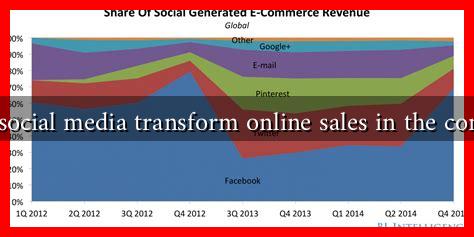-
Table of Contents
How Will Social Media Transform Online Sales in the Coming Years?
As we move further into the digital age, social media is becoming an increasingly powerful tool for businesses looking to enhance their online sales. With billions of users worldwide, platforms like Facebook, Instagram, TikTok, and Pinterest are not just social networking sites; they are evolving into robust marketplaces. This article explores how social media will transform online sales in the coming years, highlighting trends, strategies, and the potential impact on consumer behavior.
The Rise of Social Commerce
Social commerce, the integration of e-commerce into social media platforms, is set to revolutionize how consumers shop online. According to a report by Statista, the global social commerce market is expected to reach $1.2 trillion by 2025. This growth is driven by several factors:
- Seamless Shopping Experience: Social media platforms are increasingly incorporating shopping features, allowing users to purchase products without leaving the app. For instance, Instagram’s Shopping feature enables brands to tag products in their posts, making it easy for users to buy directly.
- Influencer Marketing: Influencers play a crucial role in driving sales through social media. Brands are leveraging influencer partnerships to reach targeted audiences, as consumers often trust recommendations from individuals they follow.
- User-Generated Content: Social media encourages users to share their experiences with products, creating authentic content that can influence purchasing decisions. Brands that engage with user-generated content can build trust and community.
Personalization and Targeted Advertising
One of the most significant advantages of social media is its ability to collect and analyze user data. This capability allows businesses to create highly personalized marketing strategies. In the coming years, we can expect:
- Advanced Targeting: Social media platforms will continue to refine their algorithms, enabling brands to target specific demographics, interests, and behaviors. This precision will lead to higher conversion rates.
- Dynamic Content: Brands will increasingly use dynamic content tailored to individual users. For example, Facebook and Instagram ads can change based on user interactions, showcasing products that align with their preferences.
- AI and Chatbots: Artificial intelligence will play a significant role in enhancing customer service on social media. Chatbots can provide instant responses to inquiries, guiding users through the purchasing process.
The Impact of Video Content
Video content is becoming a dominant force in social media marketing. Platforms like TikTok and Instagram Reels have popularized short-form videos, which are highly engaging and shareable. The impact on online sales includes:
- Increased Engagement: Video content captures attention more effectively than static images or text. Brands that utilize video can convey their message more dynamically, leading to higher engagement rates.
- Product Demonstrations: Videos allow brands to showcase their products in action, providing potential customers with a better understanding of their features and benefits. For example, beauty brands often use tutorials to demonstrate how to use their products.
- Live Shopping Events: Live streaming is gaining traction as a sales tool. Brands can host live shopping events on platforms like Facebook and Instagram, allowing real-time interaction with consumers and immediate purchasing options.
Building Community and Brand Loyalty
Social media is not just about selling; it’s also about building relationships. In the coming years, brands will focus on creating communities around their products, which can lead to increased loyalty and repeat purchases:
- Engagement Strategies: Brands will invest in strategies that encourage user interaction, such as polls, Q&A sessions, and contests. This engagement fosters a sense of belonging among consumers.
- Brand Transparency: Consumers are increasingly valuing transparency and authenticity. Brands that share their values and engage in social issues can build stronger connections with their audience.
- Loyalty Programs: Integrating loyalty programs into social media platforms can incentivize repeat purchases. Brands can reward customers for sharing their experiences or referring friends.
Conclusion
As social media continues to evolve, its impact on online sales will be profound. The rise of social commerce, personalized marketing, engaging video content, and community building will reshape how consumers interact with brands. Businesses that adapt to these changes and leverage social media effectively will not only enhance their online sales but also build lasting relationships with their customers. The future of online shopping is not just about transactions; it’s about creating experiences that resonate with consumers in a digital-first world.

